 We asked some family and friends what they thought about pesto.
We asked some family and friends what they thought about pesto.
The response?
“you mean that green stuff?”
That made us think a coaching tip might be helpful!
If you already make pesto at home, hopefully we can provide a useful tip or two. If you haven’t thought about using or making it at home, hopefully this will inspire you to try preparing your own “green stuff” and enjoy the great flavor it can add to a wide variety of meals!
If you’ve ever been to an Italian restaurant and had a delicious, simple pasta dish with unbelievable flavor, that flavor may have come from the magical green sauce called pesto. It is a flavor powerhouse…and the best news? It can easily be made at home! It’s so simple, there’s no cooking required, it has remarkable flavor and it’s an excellent way to use fresh, local herbs and produce!
What is pesto?
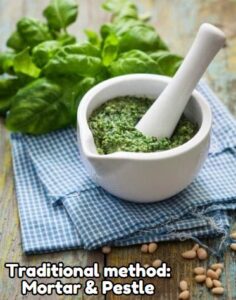 Pesto originates from Genoa (in northern Italy) and traditionally consists of crushed garlic, fresh basil, pine nuts, olive oil and a hard cheese such as Parmigiano Reggiano. Pesto comes from the word “pesta,” which means to pound or crush…this is because it’s traditionally prepared using a mortar and pestle. You know, that bowl and thick stick that looks like it should be in the Flintstone’s kitchen?
Pesto originates from Genoa (in northern Italy) and traditionally consists of crushed garlic, fresh basil, pine nuts, olive oil and a hard cheese such as Parmigiano Reggiano. Pesto comes from the word “pesta,” which means to pound or crush…this is because it’s traditionally prepared using a mortar and pestle. You know, that bowl and thick stick that looks like it should be in the Flintstone’s kitchen?
A mortar and pestle is often made of stone and can be used to crush or grind up spices and other ingredients. Today, the convenience of food processors and blenders have made it much easier and more convenient to prepare sauces and spreads such as pesto.
If you have ever heard of “Pistou,” it is the French cousin of pesto and is typically prepared using just garlic, basil and/or parsley and olive oil…it’s a great alternative for anyone allergic to dairy or nuts.
How do you use pesto?
 Or should we say, what can’t you add pesto to?! There are many, many ways to use this delicious green stuff! Pasta, veggies, eggs or omelets, fish, steaks, pizza, sandwiches, baked potatoes, marinades, soups (like vegetable or minestrone), salads and more. Plus, it freezes beautifully!
Or should we say, what can’t you add pesto to?! There are many, many ways to use this delicious green stuff! Pasta, veggies, eggs or omelets, fish, steaks, pizza, sandwiches, baked potatoes, marinades, soups (like vegetable or minestrone), salads and more. Plus, it freezes beautifully!
Mix it up!
While traditional pesto uses basil, garlic, pine nuts, olive oil and cheese, it can be fun to get creative and mix it up!
Just a few other options to consider include: cilantro with pepitas, mint with pistachios, arugula with walnuts, cilantro with peanuts and Italian parsley with walnuts and mushrooms.
These are just a few examples…you can also add other seasonings to give your pesto an ethnic flair like Asian, Cajun, Thai or others.
How do you make it?
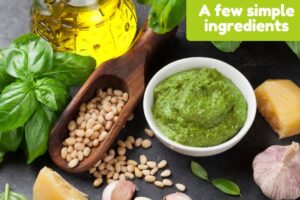 Honestly, we have made pesto in a hurry and haphazardly threw everything together in a food processor. But there is actually a recommended method how to make homemade pesto. You want it to end up slightly chunky, and NOT smooth like creamy peanut butter.
Honestly, we have made pesto in a hurry and haphazardly threw everything together in a food processor. But there is actually a recommended method how to make homemade pesto. You want it to end up slightly chunky, and NOT smooth like creamy peanut butter.
Traditional pesto is made up of:
- 4 parts fresh basil (and up to 4 garlic cloves)
- 1 part soft nuts (such as pine nuts, walnuts, almonds, pistachios, or pecans)
- 1 part olive oil
- 1 part hard cheese (such as parmesan or Romano).
For example, 2 cups basil, 1/2 cup nuts, 1/4 to 1/2 cup extra virgin olive oil, 1/4 to 1/2 cup cheese, and up to 4 garlic cloves.
- First, the basil and garlic should be roughly chopped and added, along with the nuts, to the food processor and pulse to combine.
- Then, add the olive oil (a little bit at a time) and pulse to combine it with the other ingredients until you reach your desired consistency.
- The cheese can be finely grated and mixed in by hand or with a few more pulses in the food processor.
- Ta-da…flavor-loaded homemade pesto!
Here are a few other tips to consider when making homemade pesto:
 Get your green on! Get creative with your greens…your pesto doesn’t have to be all fresh basil. You can use part fresh basil and then fill in the rest with fresh spinach or kale. We have even had great success with using part fresh basil and part carrot top leaves. This is an ideal solution when you want to make homemade pesto and just don’t quite have enough fresh basil.
Get your green on! Get creative with your greens…your pesto doesn’t have to be all fresh basil. You can use part fresh basil and then fill in the rest with fresh spinach or kale. We have even had great success with using part fresh basil and part carrot top leaves. This is an ideal solution when you want to make homemade pesto and just don’t quite have enough fresh basil.- Pulsing is key! When using a food processor or blender, use the pulse button to keep from over-processing it. It should be slightly chunky, not uniformly smooth, to enjoy each ingredient’s individual flavor.
- Preserve the color! Homemade pesto can oxidize quickly. To prevent this, you can add a thin layer of olive oil on top to help keep it from losing its color, or simply stir in a little bit of lemon juice. You will want to cover it with plastic wrap or store in an airtight container in the refrigerator, and it will keep for 1-2 weeks.
- Frozen in time! Pesto freezes perfectly so don’t let that fresh basil go to waste! You can place it in ice cube trays, then once frozen, transferred to a freezer storage bag. When you need pesto for your meal, simply thaw, or drop into your soup or stew, and you are good to go!
- Go nuts! Pine nuts aren’t the only nut for pesto. Pine nuts are great, but can be pricey, so try other nuts such as walnuts, almonds, pistachios, or pecans.
- Roast the nuts! Roasting or toasting the nuts will add another element of flavor. You can toast the nuts in a dry skillet over medium heat for about 3 minutes until lightly browned and fragrant.
- Opt for hard cheese! Homemade pesto works best with hard, salty, aged cheese such as parmesan or Romano. Soft cheeses won’t work as well…no one wants mushy pesto!
- Not quite the same! Store bought pesto is good but won’t have the same popping-flavor as homemade. And remember to read the label and beware of unrecognizable ingredients!
- If you have the time…a mortar and pestle will make homemade pesto taste even better but does require more effort and time. For most of us, a food processor will work perfectly fine for a really flavorful pesto.
Zonya Says:
“When I met Krista, I had never made fresh pesto. I was a big fan of buying it jarred because, I’m the Lickety-Split Queen. She said, ‘Fresh is so much tastier, less salty, and not hard to make.’ And, you know what? Krista is completely right! I love whipping up fresh pesto now! Especially in the summer, when I have fresh plants growing on my porch. The Grilled Vegetables with Basil Pecan Pesto is on repeat in our house. Give it a try!”
Try making homemade pesto and then enjoy these delicious ideas (there are even more on the website):
 Roasted Butternut Squash and Pesto Grilled Cheese
Roasted Butternut Squash and Pesto Grilled Cheese
Grilled Vegetables with Basil Pecan Pesto
Crispy Gnocchi with Basil Pesto
Pesto Fish Packet with Tomatoes and Green Onions
Heirloom Tomatoes with Feta and Pepitas
Grilled Sriracha Meatballs with Cilantro Peanut Pesto
SIMPLE HOMEMADE BASIL PESTO:
2 cups fresh basil leaves
1/4 to 1/2 cup grated parmesan cheese
1/4 to 1/2 cup extra virgin olive oil
1/4 cup pine nuts (or other nut of your choice)
2-4 garlic cloves (or 1 tsp garlic powder)
1/4 tsp salt (or more to taste)
1/4 tsp black pepper (or more to taste)
Directions:
1. In a blender or food processor, combine the basil, garlic and nuts. Pulse until chopped.
2. Slowly add the olive oil and pulse until combined. (Remember, you want slightly chunky pesto!)
3. Stir in the cheese, salt, and pepper until combined. Enjoy!
Dairy Free Homemade Pesto:
2-3 cups fresh basil or a variety of fresh greens or herbs + 2-4 garlic cloves (or 1/2 tsp garlic powder) + 1/2 cup walnuts (or other nuts) + 1 avocado + 2 Tbsp olive oil + 2 Tbsp apple cider vinegar + 1 Tbsp honey + 1/8 tsp salt (or more to taste)
Do you have other pesto tips and ideas?
We would love to hear from you!
 LEARN MORE ABOUT THE NAPKIN!
LEARN MORE ABOUT THE NAPKIN!

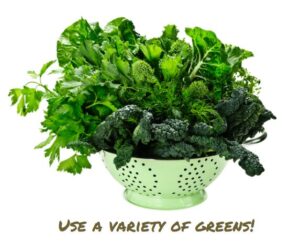
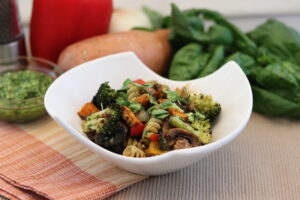
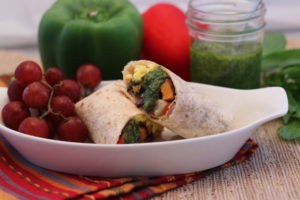
Leave A Comment